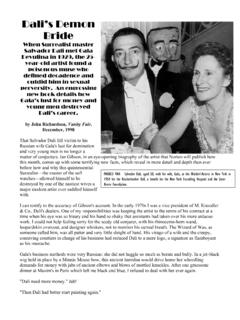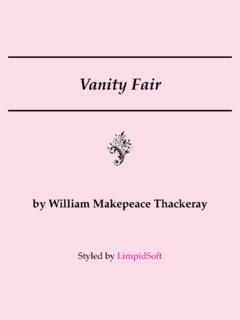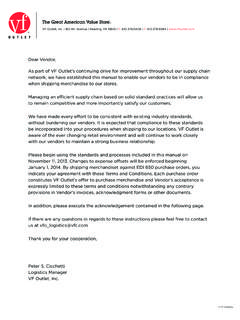Transcription of 21 PP Com Christian and Faithful on trial at Vanity Fair
1 Chapter Twenty-One Christian and Faithful on trial at Vanity fair A. The Origin and Nature of Vanity fair . John Brown gives convincing evidence that the historical basis of Vanity fair was the lavish annual fair at Sturbridge near Cambridge, a neighborhood that Bunyan was familiar with. A. half square mile in area and lasting several weeks, this fair was a vast emporium of commerce that included European representation and the spoils of the voyages of Drake and Raleigh. When business was over it was succeeded by pleasure. Round the square, in the center of which rose the great maypole with its vane at the top, there were coffee-houses, taverns, music-halls, buildings for the exhibition of drolls [jesters], legerdemain [conjuring tricks], mountebanks [itinerant charlatans], wild beasts, monsters, dwarfs, giants, rope-dancers, and the like.. Year by year the country gentry for ten or twelve miles round came in with their sons and daughters 1. for the diversions of the place.
2 1. Introduction. The pilgrims now face a seeming paradox, that is their arrival at a place which is, by and large, identical to that which they departed from. Philip Edwards resolves this problem as follows: The journey takes him [ Christian ] to Vanity fair , which is of course the very City of Destruction which he had left long before. It is a different city because Christian has become a different man. That city which he had once dwelt contentedly in, then fled from in fear, he now enters as a convinced Christian , ready to put up with whatever mockery, abuse, and violence may be directed at him. Faithful and Christian are no longer citizens of the City of Destruction; they are pilgrims and strangers in it. Their own tongue has become a place of hostility and persecution. The change is denoted not by a return (which would have done violence to other uses of the journey image) but by an arrival at a new city called Vanity . There never was any escape from the City; these refugees have to stay in it for the whole of their natural lives.
3 The alteration of the image of the journey from flight from a doomed city to arrival in a hostile city excellently conveys the transmutation 2. of the self and consequently one's surroundings in accepting Christianity. a. They progress from a personal to a public wilderness. The encounter with Talkative was depressing enough; but now the whole society he represents is actually confronted. 1. John Brown, John Bunyan, pp. 254-255. 2. Philip Edwards, The Journey in The Pilgrim's Progress, The Pilgrim's Progress, critical and Historical Views, ed. Vincent Newey, p. 114. Christian AND Faithful ON trial AT Vanity fair 323. b. They progress from worldly ambassadors to the world as a whole. Their encounters with the like of Mr. Worldly-Wiseman and Madam Wanton have been very individualistic; but now the corporate force of the world is thrust upon them. 2. Its history and purpose. THEN I saw in my dream that when Christian and Faithful had come out of the Wilderness, they immediately saw ahead of them a Town which was named Vanity .
4 Now at this Town, a fair is promoted there that is known as Vanity fair . It is maintained all the year long and bears the name Vanity fair because the Town where it is located is regarded as lighter than Vanity ; and also, because all that is sold there, as well as those who come to buy, is Vanity [worthless]. As is the saying of the wise man, All that this 3. world promotes is Vanity .. This fair is not some newly constructed business, but an enterprise going back into antiquity. Let me tell you about its origin. Almost five thousand years ago, even then there were pilgrims walking toward the Celestial City, just as these two honest 4. persons are doing. So Beelzebub, Apollyon, and Legion, along with their associates, noticing that the path along which pilgrims traveled toward the City passed through this Town of Vanity , they 5. determined to construct a fair ; it was to be a festive market in which there would be sold every sort of Vanity , and it would be open all the year long.
5 George Cheever comments: Vanity fair is the city of Destruction in its, gala dress, in its most seductive sensual allurements. It is this world in miniature, with its various 6. temptations. It is Satan's theme park and world of carnal dreams. a. Vanity and the fair that it promotes. The King's narrow highway runs directly through the town of Vanity , a bustling metropolis, that has a fair that is open all the year long. Thus pilgrims in transit are required to be insulated from the allurements of Vanity fair while not being isolated from its life (John 17:14-17; 1 Cor. 5:9-10). Not that all the citizens here are ungodly. When Christiana and her company pass this same way, they lodge for the evening at the home of Mr. Mnason (Acts 21:16), a sage Christian , who invites his friends, Mr. Contrite, Mr. Holyman, Mr. Love-saint, Mr. Dare-not-ly, 7. and Mr. Penitent to visit for a time of fellowship. 3. Ps. 62:9; Eccles. 1:2, 12-18; 2:1-26; 11:8; Isa. 40:17. 4. Mark 5:9. 5.
6 II Cor. 4:4. 6. George Cheever, Lectures on Bunyan, p. 233. 7. Bunyan, Works, III, pp. 224-25. 324 THE PILGRIM'S PROGRESS AN OUTLINED COMMENTARY. b. Vanity fair and its infernal design. This fair is but the central thrust of the marketing policy of the Corporation of Vanity . The Town is lighter than Vanity (Ps. 62:9), that is void of any consideration of the great issues of the soul such as righteousness and wisdom and life and death (Eccles. 2:11-17; 12:13-14). Rather, it promotes with great advertising skill pretty tinseled packages that soon lose their shine; they quickly corrode falling through the fingers of their owners like sand. Those items advertised as giant sized, chrome-plated, polyunsaturated, full flavored, extra strength, fully guaranteed, triple dipped wonders are soon discarded as useless trash. (1) It is as ancient as the fall of man. Shortly after the fall of Adam and Eve almost five thousand years ago [agone], Beelzebub, Apollyon, and Legion made a concerted effort to dissuade earnest pilgrims from traveling toward the Celestial City.
7 They designed a most subtle snare by which travelers would be permanently detained, and lose sight of the King's Highway (Matt. 13:22; II Cor. 4:4). Christian and Faithful enter Vanity fair Christian AND Faithful ON trial AT Vanity fair 325. (2) It remains as the purveyor of various carnal wares. (a) The intellectual enticement of being sophisticated and broadminded, not narrow, old-fashioned, and bigoted. (b) The offer of a short pleasurable rest from the rigors and discipline of a committed soldier of Jesus Christ. (c) The invitation to participate in a slightly indecent amusement since, once saved, one is always saved.. (d) The suggestion of making a slight concession to the flesh which is later applauded as a sign of liberality. 3. Its catalog and variety of delights. Therefore at this fair every type of merchandise was sold, including houses, lands, trades, places, honors, promotions, titles, countries, kingdoms, lusts, and pleasures; there were also delights of all sorts such as prostitutes, madams, wives, husbands, children, masters, servants, lives, blood, bodies, souls, silver, gold, pearls, 8.
8 Precious stones, and much more. And moreover, at this fair there is the constant entertainment of jugglers, cheats, games, plays, clowns, mimics, tricksters, rogues, and many other amusements. Here also are to be found a number of free offerings including thefts, murders, adulteries, perjurers, all 9. available in various shades of blood [scarlet]. Not all of the merchandise at Vanity fair is of the same character. There are things lawful, things doubtful, and things unlawful, yet all are promoted with selfish indulgence in mind. Even the things lawful are displayed in such a way as to distract pilgrims from the priority of the kingdom of God (Matt. 6:31-33; I Cor. 6:12; 10:23). a. For the morally sensitive, things lawful. These are things lawful that can be indulged in unlawfully, such as houses, land, countries, wives, husbands, trades, etc. b. For the morally ambivalent, things doubtful. - These are things of questionable profit that can be indulged in unlawfully such as honors, silver, gold, precious stones, plays, entertainments, servants, etc.
9 8. Matt. 6:31-32; Rev. 18:11-14. 9. Rev. 17:3-4; 18:11-14. 326 THE PILGRIM'S PROGRESS AN OUTLINED COMMENTARY. c. For the morally insensitive, things unlawful. These are things blatantly unlawful that the shameless indulge in such as lusts, prostitutes, blood, cheats, fools, thefts, adulteries, murders, lies, etc. 4. Its international and cultural representation. And as in other fairs of lesser importance, there are several lanes and streets with representative names where certain cate- gories of merchandise are marketed; so here it is the same, for you have places, lanes, and streets named after countries and kingdoms where the goods of this fair are to be found. There is the Britain Row, the French Row, the Italian Row, the Spanish Row, the German Row, where a variety of vanities is sold. But as in other fairs, where one commodity group tends to dominate over all others, so the merchandise of Rome is lavishly promoted in this fair . However, our English nation, along with some others, has expressed a disliking for this flaunted 10.
10 Huckstering. This is truly a world fair with cultural diversity and unity of purpose. The fierce competition for sales is yet for the common undertaking of waylaying passing pilgrims. a. There are many distinctive national displays. The exotic cuisine and intoxicating delicacies from Britain, France, Italy, Spain, and Germany are exhibited with great skill and appeal. b. There is the overwhelming display of Rome. While the colors of purple and scarlet predominate, there is also the supporting adornment of gold, precious stones, and pearls (Rev. 17:1-6). Added to this is the pomp of religion to which England vigorously objects. 5. Its strategic and unavoidable location. The Vanity planning commission has gone to great lengths to ensure that transient pilgrims are compelled to experience the full force of the fair 's bewitching display. a. All pilgrims must encounter Vanity fair . Now as City runs directly through this Town with its lusty fair ;. and he who would go to that City, and yet not pass through this 11.
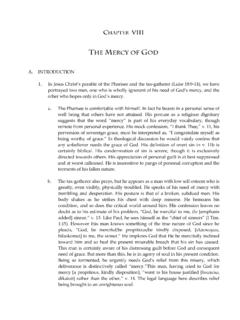

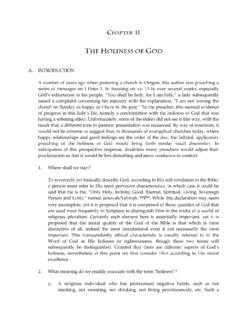

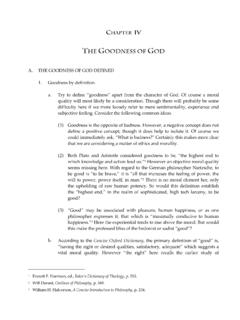





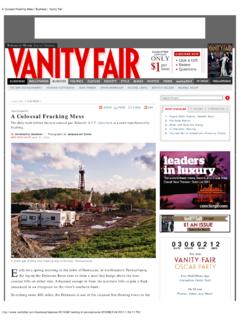

![Crue, W. (1932 [renewed 1960, 1988]). Ordeal by Cheque ...](/cache/preview/0/e/b/9/4/f/9/6/thumb-0eb94f96e14786cf5c85906ae2a7a40d.jpg)
